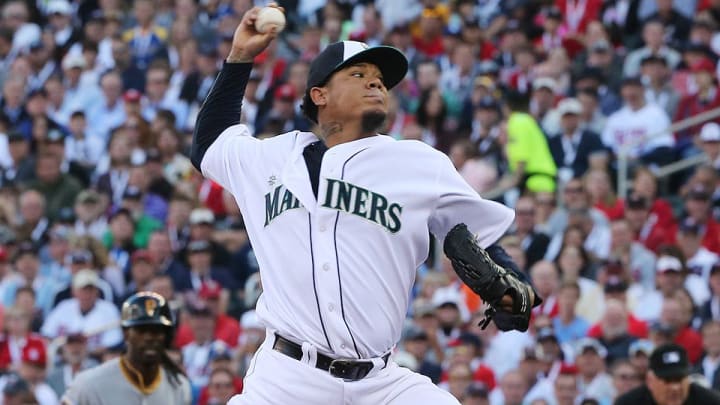Mariners' Felix Hernandez stymies Orioles to tie record streak

Felix Hernandez held the Orioles to one run over seven innings Friday night. That performance marked the 13th straight start that Hernandez pitched at least seven innings and held his opponent to two or fewer runs, tying a modern record set by Hall of Famer Tom Seaver in 1971 for the longest such streak since 1900. He also broke the modern American League record, previously held by the Philadelphia Athletics' Chief Bender, who had 12 such starts in 1907.
Awards Watch: Hernandez, Wainwright grab Cy Young race leads
Since 1900 only one player other than Hernandez, Seaver and Bender had a streak of 12 such games in a single season; that being the Astros Mike Scott in his Cy Young season of 1986, while only two others did so split over two seasons. The Mets’ Dwight Gooden finished 1985 with six such starts and started 1986 with six more, and flash-in-the-pan Giants lefty Ferdinand “Ferdie” Schupp, who finished the 1916 season with seven such starts and started 1917 with five more.
Longest streak of starts with min. 7 IP and max two runs since 1900
Pitcher | Team | Year | Starts |
|---|---|---|---|
Felix Hernandez | Mariners | 2014 | 13 |
Tom Seaver | Mets | 1971 | 13 |
Mike Scott | Astros | 1986 | 12 |
Dwight Gooden | Mets | 1985-86 | 12 |
Ferdie Schupp | Giants | 1916-17 | 12 |
Chief Bender | Athletics | 1907 | 12 |
Despite that outstanding performance, which saw Hernandez strike out ten, walk none and allow his only run on a line-drive home run by Nelson Cruz in the top of the second, Hernandez was saddled with a no-decision. His Baltimore counterpart, rookie Kevin Gausman, held the Mariners to one run over 6 2/3 innings, with lefty reliever Brian Matusz getting the final out of the seventh to strand a pair of Mariners. The Orioles ultimately won the game 2-1 thanks to a 10th-inning Chris Davis home run off Charlie Furbush. That was Hernandez’s fifth no-decision of his streak, but before you lament his poor run support consider that he has gone 7-1 over the course of his streak, while Seaver, despite averaging more than an inning more per game than Hernandez and posting an ERA 42 points lower over the course of his streak, went 8-3, while Scott, whose inning and run averages were closer to Hernandez’s, went 6-3 in his 12-game streak.
Picking American League's buyers and sellers before trade deadline
There’s something there about low-scoring environments (Safeco Field, Shea Stadium, the Astrodome) and eras (the early ‘70s, mid-80s, and now), but that can’t diminish the fact Hernandez’s streak has been matched just once since 1900. Over the course of his streak, which started in Minnesota on May 18 and now comprises almost 60 percent of his season, Hernandez has posted a 1.36 ERA and 0.76 WHIP, averaged 7.6 innings pitched per start, struck out 31 percent of the batters he has faced (10.3 per nine innings and 6.6 per every walk) and allowed just three home runs, including Cruz’s Friday night. He has also lowered his season ERA from 3.03 to 1.99.
In comparing Hernandez’s streak to Seaver’s, the difference in era goes a long way toward explaining Seaver’s edge in innings and ERA, and Hernandez’s in strikeout rates, but it’s Hernandez who was stingier with walks and home runs, and who had a lower WHIP. What’s more, Hernandez will have a chance to break Seaver’s record in his next start, which should come at home against the Braves on Tuesday. That will be just Hernandez’s second career start against the Braves. The first also came in Safeo Field, on June 29, 2011, and saw Hernandez throw 7 2/3 innings but surrender five runs to a Braves lineup from which only Freddie Freeman and Jason Heyward remain.
